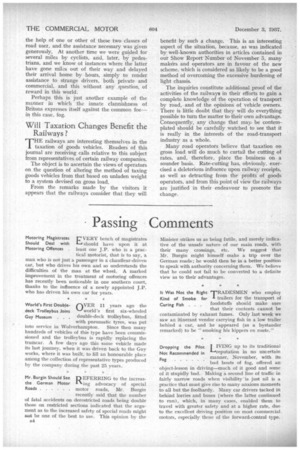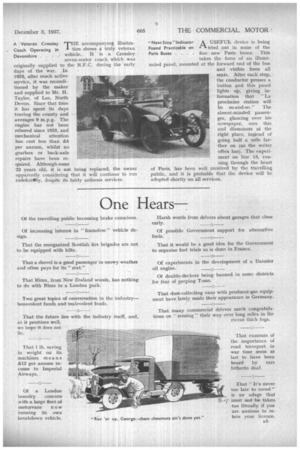Passing Comments
Page 2

Page 3

If you've noticed an error in this article please click here to report it so we can fix it.
Motoring Magistrates VERY bench of magistrates
Should Deal with " should have upon it at Motoring Offences . least one J.P. who is a prac
tical motorist, that is to say, a man who is not just a passenger in a chauffeur-driven car, but who drives his own and so understands the difficulties of the man at the wheel. A marked improvement in the treatment of motoring offences has recently been noticeable in one southern court, thanks to the influence of a newly appointed J.P. who has driven his own car for years.
World's First DoubjenVER 11 years ago the _deck Trolleybus Joins N-1 world's first six-wheeled Guy Museum . . . double-deck trolleybus, fitted
with pneumatic tyres, was put into service in Wolverhampton. Since then many hundreds of vehicles of this type have been commissioned and the trolleybus is rapidly replacing the tramcar. A few days ago this same vehicle made its last journey, when it was driven back to the Guy works, where it was built, to fill an honourable place among the collection of representative types produced by the company during the past 25 years.
Mr. Burgin Should See EFERRING to the increas the Cerman Motor "ing advocacy of special
Roads motor roads, Mr. Burgin
recently said that the number of fatal accidents on derestricted roads being double those on restricted sections indicated that the argument as to the increased safety of special roads might not be one of the best to use. This opinion by the
Minister strikes us as being futile, and merely indicative of the unsafe nature of our main roads, with their many crossings, etc. We suggest that Mr. Burgin might himself make a trip over the German roads; he would then be in a better position to speak with authority concerning them. We believe that he could not fail to be converted to a definite view as to their advantages.
TRADESMEN who employ trailers for the transport of foodstuffs should make sure that their contents cannot be contaminated by exhaust fumes. Only last week we saw an itinerant vendor carrying fish in a low trailer behind a car, and he appeared (as a bystander remarked) to be "smoking his kippers en route."
It Was Not the Right Kind of Smoke for Curing Fish . . .
LIVING up to its traditional i—ireputation in no uncertain manner, November, with its bad bouts of fog, offered an object-lesson in driving—much of it good and some of it stupidly bad. Making a second line of traffic in fairly narrow roads when visibility isjust nil is a practice that must give rise to many anxious moments to all but the foolhardy. Many car drivers tacked in behind lorries and buses (where the latter continued to run), which, in many cases, enabled them to travel with greater safety and at a higher rate, due to the excellent driving position on most commercial, motors, especially those of the forward-control type.
Dropping the Pilot Not Recommended In Fog A Veteran Crossley HE accompanying illustra
Coach Operating in A tion shows a truly veteran
Devonshire . . vehicle_ It is a Crossley
seven-seater coach which was originally supplied to the R.F.C. during the early days of the war. In 1923, after much active service, it was reconditioned by the maker and supplied to Mr. H. Taylor, of Lee, North Devon. Since that time it has spent its days touring the county and averages 9 m.p.g. The engine has not been rebored since 1923, and mechanical attention has cost less than £4 per annum, whilst no gearbox or back-axle repairs have been reqnired. Although some 22 years old, it is not being replaced, the owner apparently considering that it will continue to rim indefinillNly, despite its fairly arduous services. "NextScop"Indicator A USEFUL device is being Found Practicable on tried out in some of the Paris Buses . finenew Paris buses. This
takes the form of an illuminated panel, mounted at the forward end of the bus and visible from all seats. After each stop, the conductor presses a button and this panel lights up, giving in' formation that "La prochaine station will be so-and-so." The absent-minded passenger, glancing over his newspaper, sees this and dismounts at the right place, instead of going half a mile far-titer on (as the writer often has). The experiment on line 13, running through the heart of Paris, has been well received by the travelling public, and it is probable that the device will be adopted shortly on all services.


































